“Global Product Analytics Market to reach a market value of USD 60.04 Billion by 2031 growing at a CAGR of 20.1%”
The Global Product Analytics Market size is expected to reach $60.04 billion by 2031, rising at a market growth of 20.1% CAGR during the forecast period.
The North America segment acquired 36% revenue share in the market in 2023. The presence of major technology players, cloud service providers, and advanced analytics firms has accelerated innovation and adoption across industries such as retail, IT & telecom, healthcare, and manufacturing. Additionally, the rising demand for personalized customer experiences, predictive analytics, and real-time data insights has driven organizations to invest heavily in these analytics solutions.
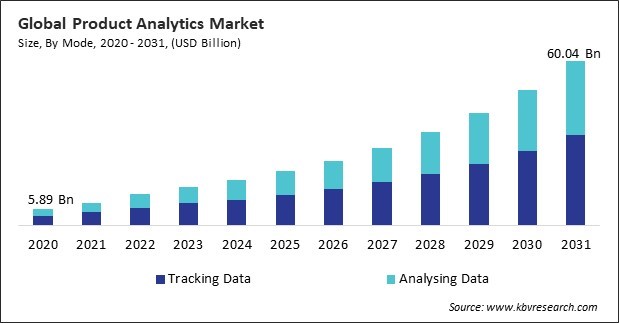
The major strategies followed by the market participants are Partnerships as the key developmental strategy to keep pace with the changing demands of end users. For instance, In June, 2024, IBM Corporation and Telefónica Tech have partnered to deploy SHARK.X, an AI-driven, multi-cloud analytics platform. This collaboration enhances enterprise data management, governance, and digital transformation, leveraging IBM's watsonx AI to develop use cases, customer pilots, and compliance solutions in Spain. Moreover, In December, 2023, Adobe, Inc. and AWS expanded their partnership to offer Adobe Experience Platform on AWS, enabling brands to leverage AI-driven insights for personalized customer engagement. This integration enhances real-time data access, journey optimization, and analytics, improving customer experiences across digital channels.
Based on the Analysis presented in the KBV Cardinal matrix; Google LLC is the forerunners in the Product Analytics Market. In October, 2022, Google LLC and Accenture expand their partnership to enhance AI, data analytics, and cloud solutions. They will invest in talent, innovation hubs, and industry-specific accelerators, optimizing ai.RETAIL with Google Cloud’s AI. This collaboration strengthens digital transformation and product analytics capabilities. Companies such as IBM Corporation and Oracle Corporation are some of the key innovators in Product Analytics Market.
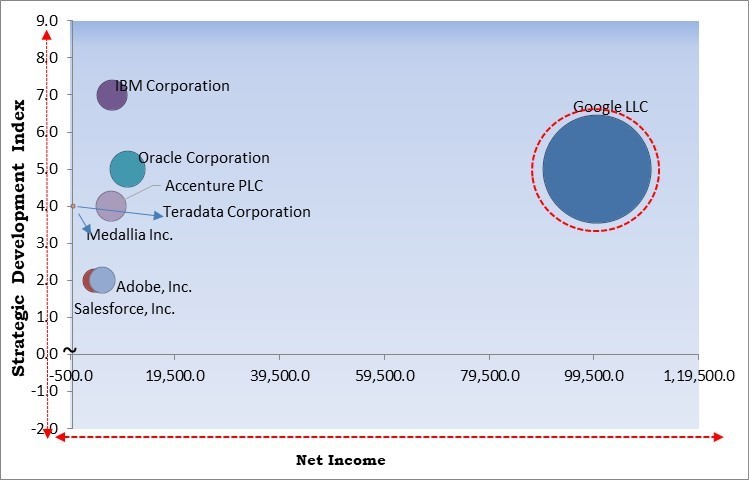
Large volumes of user data have been produced by the quick growth of digital platforms and e-commerce, which has significantly changed the worldwide retail scene. According to the United Nations Conference on Trade and Development (UNCTAD), global e-commerce sales reached approximately $27 trillion in 2022, marking a 15% increase from pre-pandemic levels in 2019. This surge encompasses business-to-business (B2B) and business-to-consumer (B2C) transactions, highlighting the growing reliance on online channels for commercial activities. Consequently, the symbiotic relationship between the expansion of digital platforms and the adoption of these analytics continues to propel the evolution of the global digital economy.
Additionally, As businesses strive to better understand user behavior and optimize product performance, the demand for more sophisticated analytics solutions has surged. This has led to significant innovation in artificial intelligence (AI), machine learning (ML), and big data, now core components of modern product analytics platforms. AI and ML technologies have revolutionized how data is processed and interpreted, enabling businesses to uncover deeper insights into customer preferences, usage patterns, and product interactions. Thus, the combination of continuous technological advancements and robust financial investments has significantly expanded the capabilities of product analytics tools.
However, Since product analytics involves collecting and analyzing large volumes of user data, there is a heightened risk of data breaches and unauthorized access. This sensitive data often includes personal information, behavioral patterns, and purchasing habits, making it a lucrative target for cybercriminals. A single data breach can result in substantial financial losses, legal repercussions, and reputational harm, which is why numerous businesses are hesitant to implement product analytics solutions. Hence, without addressing these concerns effectively, the adoption of product analytics tools will continue to face resistance from privacy-conscious organizations.
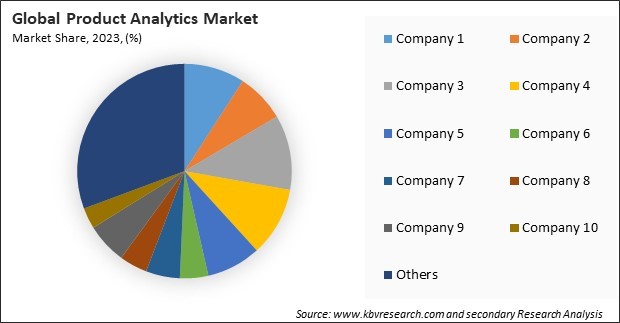
The leading players in the market are competing with diverse innovative offerings to remain competitive in the market. The above illustration shows the percentage of revenue shared by some of the leading companies in the market. The leading players of the market are adopting various strategies in order to cater demand coming from the different industries. The key developmental strategies in the market are Acquisitions, and Partnerships & Collaborations.
Based on component, the market is bifurcated into solution and services. The services segment procured 24% revenue share in the market in 2023. The services segment is propelled by the growing need for expert consulting, seamless integration, and continuous support to help businesses maximize the benefits of product analytics solutions. Many organizations, especially small and medium-sized enterprises (SMEs), lack in-house expertise and require professional assistance to implement and customize analytics platforms.
Based on deployment, the market is segmented into cloud and on-premise. The on-premise segment witnessed 28% revenue share in the market in 2023. The on-premise segment remains crucial to the product analytics market, particularly for industries prioritizing data security, regulatory compliance, and full control over IT infrastructure. Banking, healthcare, and government sectors rely on on-premise deployments to ensure data sovereignty, confidentiality, and system reliability.
On the basis of application, the market is divided into sales & marketing, consumer engagement, and design & manufacturing. The sales & marketing segment procured 35% revenue share in the market in 2023. Businesses leverage AI-powered predictive analytics, automated segmentation, and campaign performance tracking to optimize marketing efforts and improve customer acquisition and retention. The rising dominance of digital marketing, e-commerce, and omnichannel sales strategies has fueled the demand for analytics solutions that provide real-time insights into consumer preferences, pricing trends, and engagement metrics.
By enterprise size, the market is divided into large enterprises and small & medium enterprises (SMEs). The small & medium enterprises (SMEs) segment acquired 37% revenue share in the market in 2023. As digital transformation turns into a need rather than a choice, SMEs are implementing analytics systems that are easy to use, scalable, and reasonably priced in order to enhance operational effectiveness and customer experience. The rise of Software-as-a-Service (SaaS)-based analytics tools, which require minimal upfront investment and offer flexible pricing models, has significantly lowered the entry barrier for SMEs.
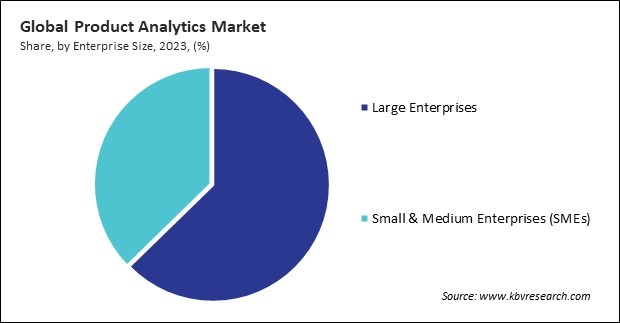
On the basis of mode, the market is bifurcated into tracking data and analyzing data. The analyzing data segment witnessed 43% revenue share in the market in 2023. Companies are increasingly relying on analytics to extract actionable intelligence from vast datasets, enabling data-driven decision-making and strategic planning. The growing emphasis on personalization, churn prediction, and user engagement optimization has fueled the demand for analyzing data solutions.
On the basis of end user, the market is classified into retail & e-commerce, BFSI, IT & telecommunication, media & entertainment, healthcare & pharmaceuticals, and others. The BFSI segment witnessed 19% revenue share in the market in 2023. The growing reliance on predictive analytics for credit scoring, regulatory compliance, and investment strategies has further fueled demand. Additionally, the surge in digital banking, mobile payments, and blockchain integration has intensified the need for advanced analytics to enhance security and operational efficiency.
Free Valuable Insights: Global Product Analytics Market size to reach USD 60.04 Billion by 2031
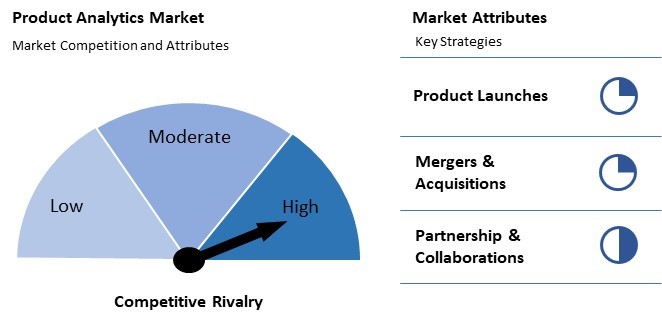
The Product Analytics Market remains highly competitive with numerous emerging startups and mid-sized firms innovating in AI-driven insights, real-time analytics, and user behavior tracking. Open-source solutions and industry-specific platforms further intensify competition. Differentiation hinges on affordability, niche targeting, and seamless integrations, making it a dynamic landscape driven by technological advancements and evolving customer needs.
Region-wise, the market is analyzed across North America, Europe, Asia Pacific, and LAMEA. The Europe segment recorded 32% revenue share in the market in 2023. The European market is driven by strict data protection regulations (such as GDPR), industrial automation, and the adoption of AI-powered analytics. European businesses, particularly in the automotive, manufacturing, and retail sectors, leverage analytics to improve supply chain efficiency, product performance, and customer engagement.
| Report Attribute | Details |
|---|---|
| Market size value in 2023 | USD 14.05 Billion |
| Market size forecast in 2031 | USD 60.04 Billion |
| Base Year | 2023 |
| Historical Period | 2020 to 2022 |
| Forecast Period | 2024 to 2031 |
| Revenue Growth Rate | CAGR of 20.1% from 2024 to 2031 |
| Number of Pages | 360 |
| Number of Tables | 613 |
| Report coverage | Market Trends, Revenue Estimation and Forecast, Segmentation Analysis, Regional and Country Breakdown, Competitive Landscape, Market Share Analysis, Porter’s 5 Forces Analysis, Company Profiling, Companies Strategic Developments, SWOT Analysis, Winning Imperatives |
| Segments covered | Mode, Component, Deployment, Application, Enterprise Size, End User, Region |
| Country scope |
|
| Companies Included | IBM Corporation, Oracle Corporation, Google LLC (Alphabet Inc.), Salesforce, Inc., Adobe, Inc., Medallia Inc., Accenture PLC, Teradata Corporation, SAS Institute Inc., and QlikTech International AB (Talend, Inc.) |
By Mode
By Component
By Deployment
By Application
By Enterprise Size
By End User
By Geography
This Market size is expected to reach $60.04 billion by 2031.
Expansion Of E-Commerce And Digital Platforms are driving the Market in coming years, however, Data Privacy And Security Concerns restraints the growth of the Market.
IBM Corporation, Oracle Corporation, Google LLC (Alphabet Inc.), Salesforce, Inc., Adobe, Inc., Medallia Inc., Accenture PLC, Teradata Corporation, SAS Institute Inc., and QlikTech International AB (Talend, Inc.)
The expected CAGR of this Market is 20.1% from 2023 to 2031.
The Large Enterprises segment led the maximum revenue in the Market by Enterprise Size in 2023, thereby, achieving a market value of $36.8 billion by 2031.
The North America region dominated the Market by Region in 2023, and would continue to be a dominant market till 2031; thereby, achieving a market value of $20.4 billion by 2031.
Our team of dedicated experts can provide you with attractive expansion opportunities for your business.
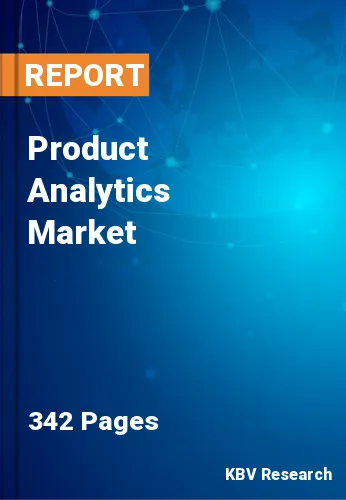
 Drivers
Drivers
 Restraints
Restraints
 Opportunities
Opportunities
 Challenges
Challenges
